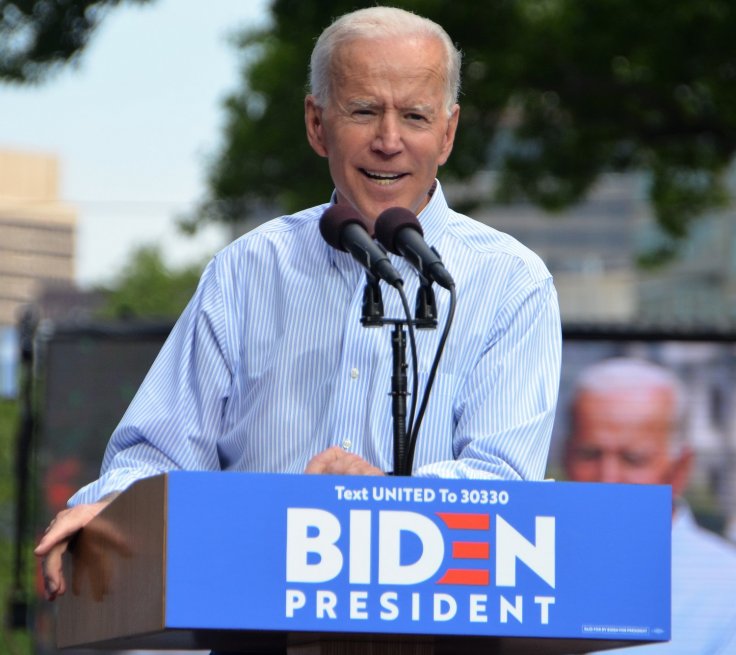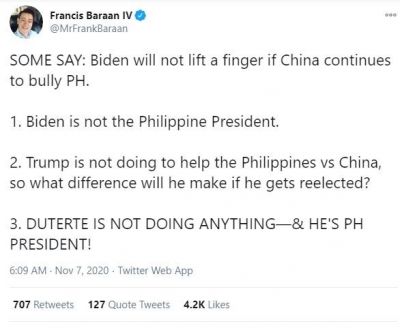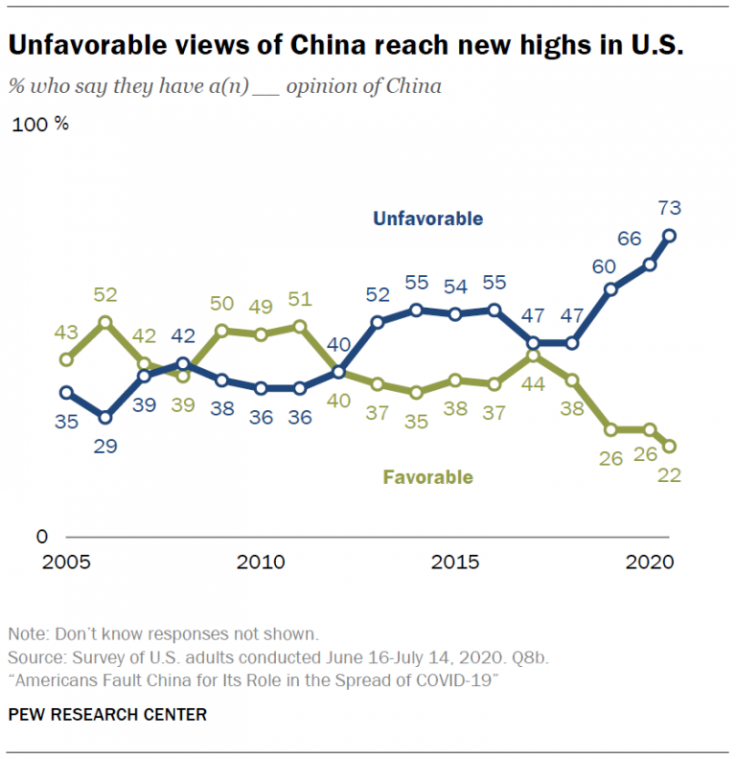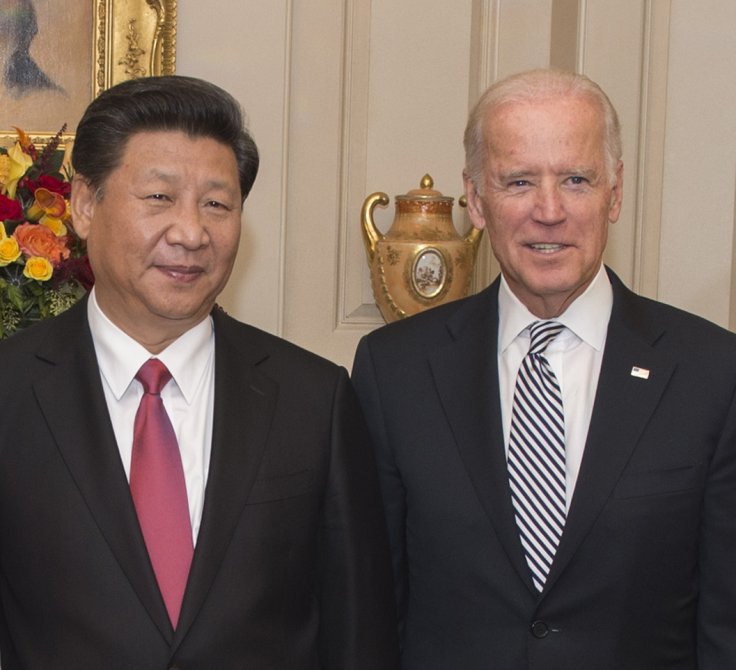Under Donald Trump's presidency, Russia hasn't been the designated enemy of the U.S. Instead, the focus has mainly shifted to China. As the distrust has grown, it has taken the two superpowers further apart. In the last two years alone, the two countries have been involved in a cold war-esque strategy demeaning each other and fighting a trade war. While the U.S. economy suffered a blow due to the Coronavirus pandemic, China relatively escaped unscathed, further enraging Washington.
Trump's views on China have also heavily reflected on Americans. According to a survey conducted by the Pew Research Center, 73 percent of Americans had a negative view of China. Americans blame China for the Coronavirus outbreak and Trump made it a weapon to fight Beijing and also his Democratic challenger Joe Biden. He tried to make people believe that Biden would be soft on China and won't take any hard stance as he did. But his own handling of the Coronavirus crisis in the U.S. didn't help him in this case.
While people still have doubts if Biden would be a suitable candidate to take on China's wolf warrior diplomacy, the situation will be different. As of November 8, Biden was placed ahead in the U.S. Presidential race to be the next President on January 20. Considering that many experts have already been asking the question -- what would a Biden presidency mean for China?

Biden's Policy for China
While Trump his hard stance on China has been echoed by millions of Americans, it hasn't done any good to neither the U.S. nor its allies in Asia. Instead, important allies like Japan, South Korea and India have tried to find their own ways to deal with China.
Biden, unlike Trump, comes with years of experience in foreign policy matters. As the chairman of the Senate foreign relations committee in President Barack Obama's administration, Biden was tough where he needed to be and soft when it did the work.
From constantly criticizing Beijing's human rights abuse of workers to working out a delicate Iran nuclear deal, he dealt with all the world leaders. But expect Biden to be tough on China as well. He has called Chinese President Xi Jinping a "thug" and is likely to pursue Beijing over various matters including tariffs, South China Sea, Coronavirus, cyber espionage and human rights abuse in Xinjiang over Uighur Muslims and in Hong Kong.






On Coronavirus
As the rift between the U.S. and China has constantly grown, the Coronavirus pandemic has become the epitome of debate in recent times. Trump has accused Beijing of lying about the virus and blamed it for the pandemic, using words that mostly every leader in the world refrains from.
The U.S. found support from other countries asking for an independent probe into the origin of the virus, trying to prove that China's early response was either inadequate or it had something to do with "bioengineering" the virus.
Biden, however, hasn't been vocal against China on the matter. Instead, he has focused on the domestic response to the pandemic. But he too believes in being "tough on China". Biden during the presidential debate said he would hold China accountable. "I will make China play by the international rules," he said. While he didn't give out specifics, he is expected to take a measured approach that could yield results.

Strengthening Anti-China Allies
Over the last four years, the dynamics in Asia has changed. Trump has threatened to reduce its troops. With Washington resorting to a pay-for-service approach for its allies in East Asia, the U.S. lost its leadership role. Besides, Trump has undermined Asian allies Japan and South Korea by building direct ties with North Korean dictator Kim Jong Un. Thanks to that, Japan has already moved from its pacifist role while South Korea is also planning to build its own weapons arsenal, reducing dependence on the U.S.
But Biden instead is likely to get back to the foreign policy that the Obama administration preferred with both Japan and South Korea. Supporting both important allies in the region will be key to win the battle against China. Furthermore, India is another country that has been in direct conflict with China. The bloody border clash at the Galwan valley in Ladakh has taken the countries apart.

India is likely to be a key player against China. Its workforce and military both match China's might. With a little push from the U.S., India can become its most important ally in the region than other nations. Despite being more developed, other countries do not have the capacity to challenge China. Biden has already talked about strengthening allies with similar values to corner China and that's where India can play a huge role.
"Working cooperatively with other nations that share our values and goals does not make the United States a chump. It makes us more secure and more successful. We need to fortify our collective capabilities with democratic friends beyond North America and Europe by reinvesting in our treaty alliances with Australia, Japan, and South Korea and deepening partnerships from India to Indonesia to advance shared values in a region that will determine the United States' future," Biden wrote in Foreign Affairs magazine.
South China Sea
For a long time now, the South China Sea has been one of the most conflicted zones on the planet and striking a balance would be necessary. China has disputes with every country in the region and the U.S. has played a key role in maintaining a balance.
But Washington's cozying up to Taiwan has infuriated Beijing and it has increased its military presence in the region. While Trump has tried to show American might with destroyers and fighter jets in the region, it hasn't helped. Biden may not directly interact with Taiwan's leadership. Instead, he would rather take a diplomatic route while also being tough with military presence to maintain the status quo.
War Against China's Technology
The other aspect of the cold war against China has been technology. China has exerted greater control over Chinese companies by limiting and banning the export of artificial intelligence technology among others. Trump retaliated by classifying Huawei and ZTE as Chinese spies, blocking access to the Western market. While he won there, he failed in dealing with ByteDance, another Chinese technology giant behind TikTok.
The short video app has been under the scanner for collecting user data and sending it to China. While TikTok has always denied the claims, cybersecurity researchers have provided plenty of proof. Trump decided to ban the short video app in the U.S. but could not. He tried to force the company into selling TikTok's U.S. business to an American company. But failed there as well. ByteDance agreed to sell only 20 percent of its business to an American company.
Instead of confronting Chinese tech companies, Biden wants a cooperative approach from U.S. allies to corner China's technology and safeguard American tech companies. "To win the competition for the future against China or anyone else, the United States must sharpen its innovative edge and unite the economic might of democracies around the world to counter abusive economic practices and reduce inequality," Biden said.









